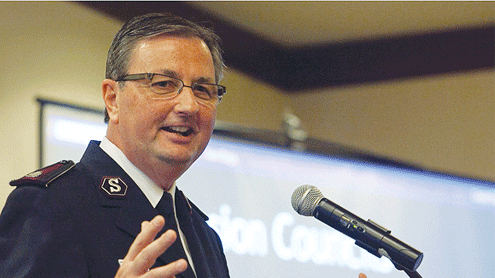
By Bob Docter
“This is an officers councils,” Commissioner James Knaggs, territorial commander, announced, “but it’s like no other officers councils in my memory, for we have invited all of you—all of the employees at THQ [territorial headquarters] to spend the day with us. We want you to learn the way God’s spirit gets into our minds and our hearts. This is ‘mission inclusiveness.’”
Knaggs welcomed employees and officers alike to the first-ever THQ Missions Councils in late October—a day designed to ensure that everyone understands the nature and scope of The Salvation Army’s worldwide mission and that of the Western Territory, which reaches across eight time zones and touches millions of people from hundreds of cultures.
“The Salvation Army is the largest army in the world—an Army that has never fired a shot in anger nor captured a single acre of ground,” Knaggs said. “We engage in an immense practical ministry with strong social commitments that seek to address every sort of need within every culture. We also present a wonderful spiritual dynamic that changes lives. Employees are part of our mission and play a vital role.”
Lt. Colonels Doug and Diane O’Brien, personnel secretary and community care/women’s auxiliaries/older adult ministries secretary, respectively, together articulated the meaning of “salvation,” and, with song, spelled out large chunks of history. They described the Army as “omni-sacramental where all of life becomes a sacrament to God.”
The O’Briens also covered other Army distinctives, touching on gender matters, multicultural commitments, uniform wearing and that we are all “partners in mission.”
Knaggs spoke of new programs and events in the West—“mission advances” to win the world for Jesus—including: The Gathering, a territorial congress in 2012 held in conjunction with the ordination, commissioning and assignment to the field of the “Friends of Christ” session of cadets and the first visit of General Linda Bond to the West; savn.tv, an online outreach to communicate the message and meaning of Christ; People Count, an intentional effort to draw people to our mission priorities through the weekly collection and presentation of data from every corps and social service program in the territory; California United, with a goal to be at the table with legislators, the governor and other administrators; and a plan to better connect Adult Rehabilitation Centers beneficiaries and graduates to our corps.
The Church and the Army
Commissioner William Francis, who retired from appointment as territorial commander for the Canada and Bermuda Territory, presented the historical development of Christianity from its beginning to the present day.
He articulated the phenomenal growth of the early Church—moving from 11 disciples plus Paul through the evangelization of Asia Minor, spreading into the Roman Empire and eventually becoming the official religion of the empire.
“The church was called by the power of God’s grace and exists to worship and witness, to preach to the Gentiles the unsearchable riches of Christ (Eph. 3:8),” Francis said. “Those who heard were convinced of the message of personal salvation in Christ, and that Christ alone was the hope of the world.
Quoting from John 13:35, Francis identified the mark of a Christian. By this shall all men know that you are my disciples, if you have love for one another, and further explained the message of the Christian through John 3:16: For God so loved the world that he gave his only son that whosoever believed on him shall not perish but have everlasting life.
“The church was committed to evangelism,” Francis said, as we need to be today. “Unless we all communicate the message of Christ we won’t ever achieve our goal. We need to start by loving people.”
Commissioner Larry Bosh, international secretary for the Americas and Caribbean, spoke about the Army’s organization internationally, including leadership of Army work in 124 countries, 175 languages and 60 territories. Divided into five zones, Bosh explained that international secretaries give oversight and coordinate the work in each area, serving as the administrative link to the General.
The United States is part of the Americas zone, the largest geographically. Thirty-one percent of all Salvation Army officers are located in this zone, but only 11 percent of senior soldiers and nine percent of junior soldiers are. In contrast, Africa has 42 percent of senior soldiers and 67 percent of junior soldiers. Simultaneously, over 70 percent of the international budget comes from North America.
As Bosh asked, “What’s wrong with this picture?”
Let’s first form the best answer to that question and then figure out what to do about it.











